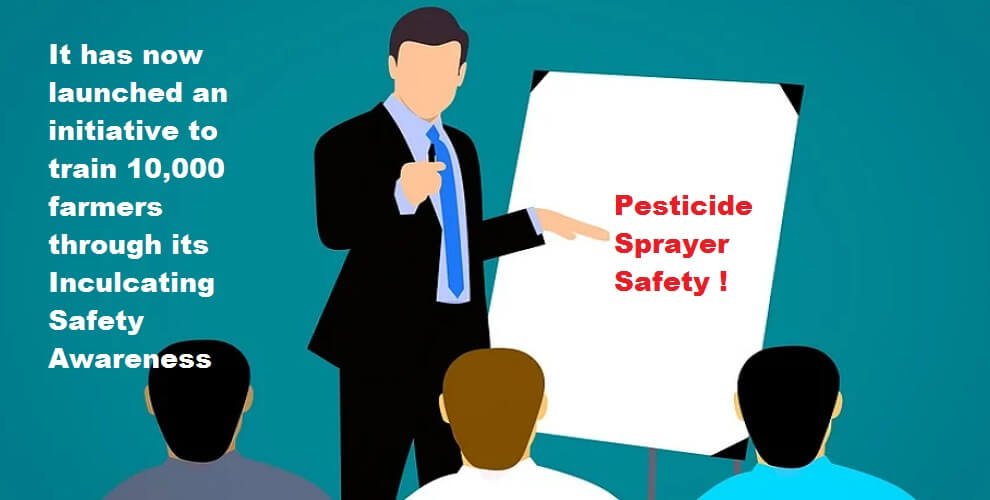A few farmers died in Maharashtra four years ago as a result of pesticide inhalation while spraying their crops. The majority of them were from the Yavatmal district.
According to police records obtained under the Freedom of Information Act, 22 farmers died that year as a result of pesticide poisoning, and over 300 were injured.
‘The major tragedies that led to the unfortunate pesticide exposure incident in Yavatmal in 2017 was the random mixing of chemicals and the lack of adequate precautions while spraying pesticide on crops,’ says KC Ravi, Chief Sustainability Officer, Syngenta India, a subsidiary of Switzerland-based agricultural science and technology company Syngenta.
Also Read: Heavy pesticide use declining pollinator populations, impacting food production
The issue arose as a result of growers cultivating illegal genetically modified (GM) cotton and workers spraying pesticides on farms failing to take adequate precautions. An erratic monsoon, followed by pest attacks, exacerbated the problem.
Inadequate precautions
Farmers cultivated unauthorized genetically modified (GM) cotton, and farm workers spraying agrochemicals on the crops did not take precautionary measures. An erratic monsoon, followed by pest attacks, exacerbated the problem.
According to Ravi, the cotton plants grew to unusual heights, and the farm laborers failed to use personal protection equipment (PPE) kits, such as gloves and masks while spraying pesticides. ‘Doctors were also unable to diagnose and treat the affected,’ he adds.
Syngenta India got involved here by first trying to figure out how to help the Yavatmal district administration. ‘We began a mobile clinic to treat those who had been exposed to pesticide residues,’ Ravi explains.
Educating doctors
The Swiss farm’s Indian arm then began an awareness program for doctors by bringing in a toxicologist. Personal protection equipment (PPE) kits for pesticide sprayers were also made available by the company.
Syngenta then set about closing the pesticide spraying gaps by first training farmers. ‘Training and counseling farmers is an important strategy. ‘At the start of every farmer meeting, the Syngenta team spends 15 minutes training the growers on safe use practices,’ Ravi tells.
Syngenta has developed five simple guidelines for the safe use of crop protection methods, including understanding the product, exercising caution, and using appropriate PPE kits, in addition to a safe spraying initiative. It has now launched an initiative to train 10,000 farmers through its Inculcating Safety Awareness for Farmer Empowerment (I-SAFE) program.
Providing growers with knowledge and tools
‘I-SAFE is a first-of-its-kind initiative to raise awareness about health and safety among Yavatmal farmers while also providing them with tools and techniques,’ he says.
A Spraymen Entrepreneur program is a component of the I-SAFE program. ‘We launched a professional agri-entrepreneurship program to train professional spraymen who will provide spraying services to farmers,’ said a Syngenta official.
Farmers can benefit from the company’s dedicated application technology training programs, which provide technical know-how on increasing spray efficiency while reducing chemical losses. It also instructs users on how to repair and maintain spray equipment.
Also Read: Post-harvest Startup trains farmers and FPOs to market though NCDEX
There were no fatalities
Farmers have now explained the advantages of wearing gloves, goggles, and other protective gear as part of the PPE kit, according to Aashish Umeshrao Moghe, a Yavatmal farmer who has got safe spraying training.
Syngenta’s initiative has been running for four years in Yavatmal’s Mangrul village, and Akshay Prakash Lonkar, a resident, says there has been an increase in the number of protective kits used by farmers.
Following the launch of the I-SAFE program, Syngenta has been designated as the nodal agency in the districts of Yavatmal and Osmanabad to ensure pesticide spraying safety. Over the last three years, ‘we have worked with district administrations to ensure that there are no fatalities,’ says Ravi.


















Add Comment